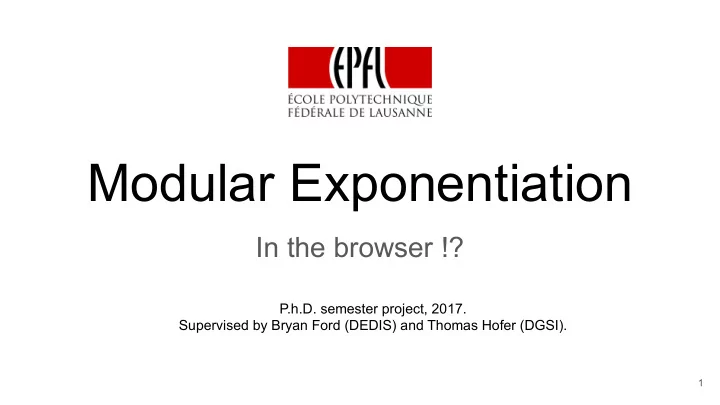

Modular Exponentiation In the browser !? P.h.D. semester project, 2017. Supervised by Bryan Ford (DEDIS) and Thomas Hofer (DGSI). 1
Background The digital world takes an overwhelming part in our daily life. Voting is still paper-based and requires physical presence... Can we make people vote from their bed in a secure way ?? 2
CHVote Geneva is developing a next-gen voting solution for its canton: CHVote. Lot of people living abroad are expected to use the solution. Full formal specifications written by people from the e-Voting group, RISIS, in BFH. Implementation in progress by the DGSI (“Direction générale des systèmes d'information”) 3
Encrypted vote in the browser... Secure voting requires encryption of the vote at the client’s side ● Up to hundreds of votes to encrypt for one client RSA encryption uses modular exponentiation with 1024,2048 or 4096 bit keys. g^s mod q Modular exponentiation is a slow operation. 4
Modular exp. in Javascript ? Javascript is an interpreted language and runs in the browser ● It it *not* fast ● Garbage collected ● Not to mention all the security issues... Nevertheless, a better choice than sending a vote in the clear! 5
What can we do ? Outsource the heavy computation to remote servers (honest-but-curious). In this context: (1) Partial exponentiation ● Base is the public key so it is public ● Exponent is private (encoded vote) ● Modulo is public (security parameter) Partial exponentiation request & Fast reconstruction locally with multiplication 6
What can we do ? Offload the heavy computation to remote (2) Local Reconstruction servers (honest-but-curious) ! In this context: ● Base is the public key so it is public ● Exponent is private (encoded vote) ● Modulo is public (security parameter) Partial exponentiation request & Fast reconstruction locally with multiplication 7
What can we do ? Offload the heavy computation to remote servers (honest-but-curious)! In this context: (2) Local Reconstruction ● Base is the public key so it is public ● Exponent is private (encoded vote) ● Modulo is public (security parameter) Partial exponentiation request & Fast reconstruction locally 8
Splitting the computation Partial exponentiation: v = <vote> a = <public key> q = <modulo> s_i = <random> (i: 0...n-1) s_n = v - SUM(s_i) (i: 0 … n-1) Each server i computes: r_i = a^(s_i) mod q 9
Splitting the computation Partial exponentiation: Local Reconstruction: v = <vote> e = <encrypted vote> a = <public key> q = <modulo> e = MUL(r_i) (i: 0 … n) s_i = <random> (i: 0...n-1) = a ^ (SUM(s_i)) mod q s_n = v - SUM(s_i) (i: 0 … n-1) = a ^ [SUM(s_i) + v - SUM(s_i)] Each server i computes: = a ^ v mod q r_i = a^(s_i) mod q 10
Evaluation: Comparison between: ● Pure Javascript ● Using JSBN library from Tom Wu at ● Split method Stanford (fastest library ?) ● WebAssembly ● Simple one line of code... 11
Evaluation: Comparison between: ● Front end in JS (share splitting + JSON encoding) ● Pure Javascript ○ ~50 lines ● Split method ● Backend in Go using binding to GMP ● WebAssembly ○ Less than 100 lines ● Optimized to send the minimum amount of data 12
Evaluation: Comparison between: ● Pure Javascript ● Split method ● WebAssembly ● Compiled GMP to Wasm in 32 bit ○ Using LLVM 32 bit ○ Without assembly code :( ● Small wrapper in C for mod. Exp. ● Copy data to Wasm heap from JS ○ All in one call 13
Results: Comparison between: ● Pure Javascript ● Split method ● WebAssembly For different key sizes: ● 1024 bits ● 2048 bits ● 4096 bits 14
Results: Comparison between: ● Pure Javascript ● Split method ● WebAssembly For different key sizes: ● 1024 bits ● 2048 bits ● 4096 bits 15
Results: Comparison between: ● Pure Javascript ● Split method ● WebAssembly For different key sizes: ● 1024 bits ● 2048 bits ● 4096 bits 16
Future work ● Look at verifiable computation (NIZK) ○ Is it possible ? ○ Is it expensive ? ○ Look at recent progress such as “ CExp: secure and verifiable outsourcing of composite modular exponentiation with single untrusted server “ (Shuai Li) ● Code optimized hand-written WebAssembly code for modular exponentiation ● Experience with a varying number of servers (3 so far) 17
Conclusions Outsourcing the heavy computation is good in this context ● Performs an order of magnitude better than other solutions ● No need for verification of correct output 18
https://github.com/dedis/students_17_geneva Conclusions Outsourcing the heavy computation IS good in WebAssembly is not ready for prime time yet . this context ● Performs much better in an infinite loop ● Performs an order of magnitude better (graphics) than other solutions ● Compiles only in 32 bit ● No need for verification of correct output ● Can’t compile hand-written assembly 19
Recommend
More recommend